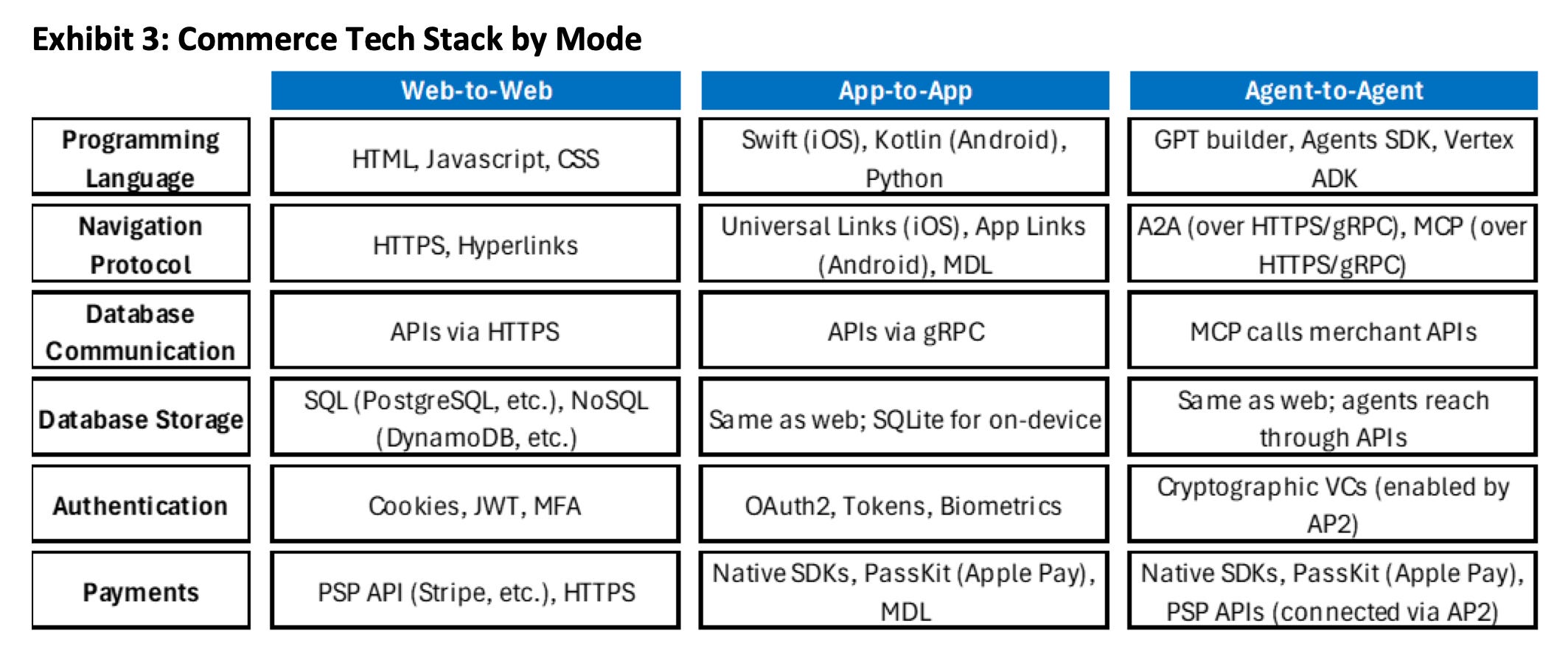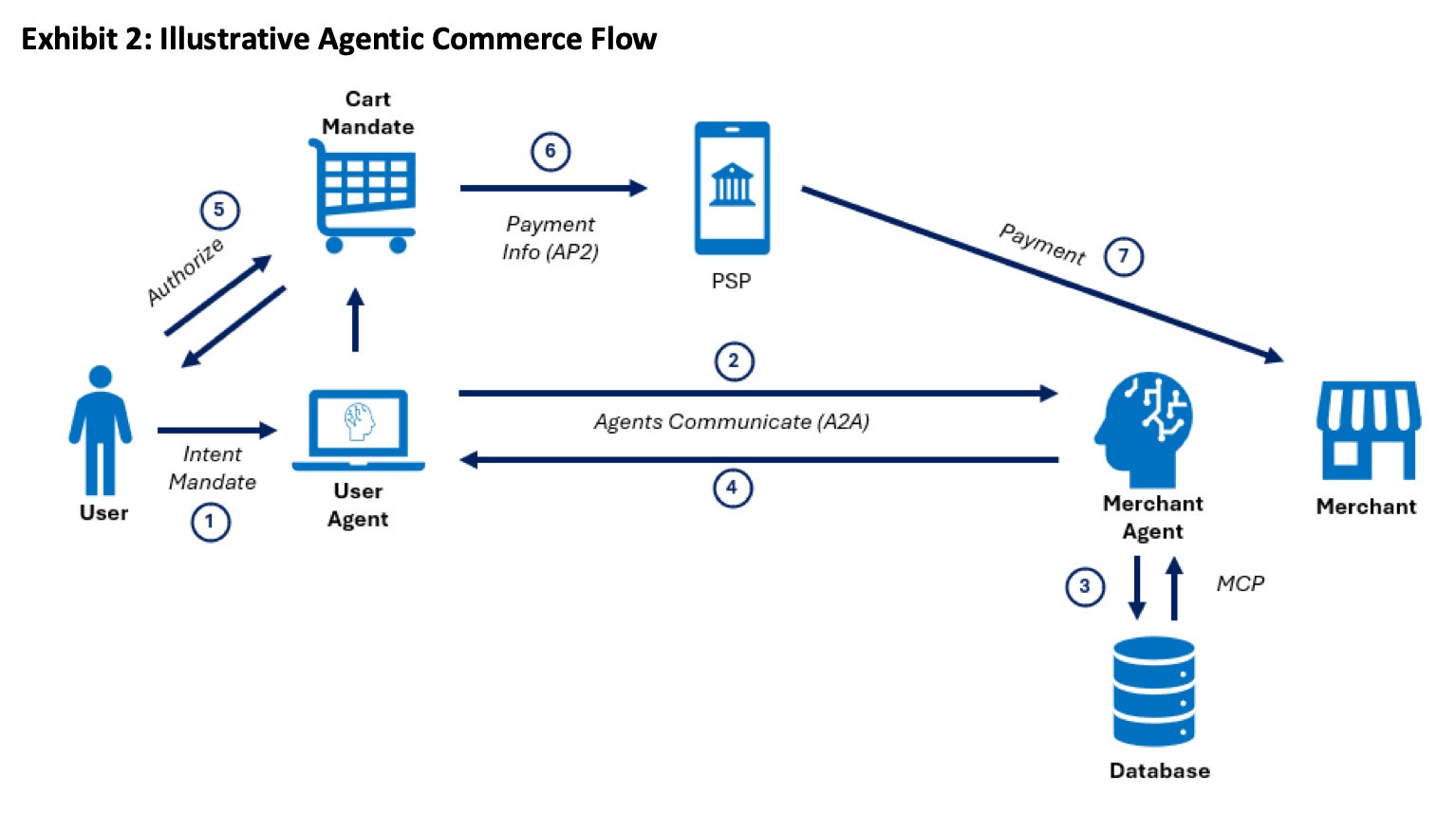
Science Photo Library via Reuters Connect
- AI agents may reshape the internet, automating tasks such as booking and payments.
- Tech giants including Google and OpenAI are developing protocols for a future agentic digital economy.
- New protocols are being designed to secure transactions driven by AI agents rather than humans.
A new internet age is taking shape, and it’s not about screens, clicks, or even swipes. It’s about AI agents, autonomous software programs that act on your behalf, fetching deals, booking flights, managing workflows, and even paying for things, all without you lifting a finger.
The architecture powering this agentic era is being built now, and Big Tech companies are vying to establish early technological footholds.
According to Cantor Fitzgerald’s latest Bytes report, the past six months have seen rapid advances in foundational protocols enabling these AI agents to operate across platforms. And like railroads and previous frontier innovations, the race is now on to define the rails of this new digital economy, and tech giants, including Google, OpenAI, and Anthropic are laying the groundwork.
Why does this matter? As Cantor noted, whoever sets the standards wins long-term. Just as Google and Apple locked in developer ecosystems during the web and mobile eras, today’s protocol pioneers may dominate the agentic future.
“Keeping tabs on who is building, maintaining, and supporting these frameworks has been useful in evaluating long-term competitive moats,” Cantor analysts Deepak Mathivanan and Jack Halpert wrote. “As such, companies that pioneer the standards historically have benefited from ecosystem lock-ins and captured a large share of economics over time.”
Goodbye apps, hello protocols

Cantor Fitzgerald
The web was built with HTML pages, navigating through hyperlinks and HTTP protocols. Cookies are used for preserving session states on web pages and security is maintained via SSL certificates. SQL or NoSQL queries enable database access for business logic, while payment processing is done with APIs to external gateways.
In the mobile era, apps are built using native OS programming languages such as Swift, Java, and Kotlin. Those apps communicate through mobile deep linking. AppleID and AndroidID are used for preserving session states on smartphones. Authorization and authentication are done with OAuth 2.0 tokens, originally launched by Twitter and adopted broadly by Google and others. Payment processing is handled using SDKs, such as Stripe’s mobile SDK, and mobile wallets like the Apple Pay API, using NFC communication.
The emerging agentic era is being built on a radically different tech stack. Instead of user-driven apps, agents handle intent through frameworks such as OpenAI’s Agents SDK and Google’s Vertex ADK. They don’t click, they communicate, and they do it using protocols.
Google’s Agent2Agent (A2A) is emerging as the lingua franca for inter-agent communication. Launched in April, A2A enables secure, structured exchanges between AI agents representing users and other agents representing merchants. It’s a foundational layer, akin to HTTP for the web or deep links for mobile.
Meanwhile, Anthropic’s Model Context Protocol (MCP) connects agents to backend systems such as databases, pricing engines, and workflows, replacing the patchwork of APIs and integrations that power legacy commerce online.
More recently, Google rolled out AP2, an agent-native payments protocol. It aims to tackle trust, authorization, and fraud, helping users issue “Intent Mandates” and “Cart Mandates” that empower AI agents to complete transactions on their behalf. Google is collaborating on this with over 60 companies including PayPal, American Express, and Etsy.
On Thursday, Cloudflare said it plans to introduce NET Dollar, a US dollar-backed stablecoin designed to enable secure transactions for the agentic web.
Commerce rewritten
The shift is more than technical. It reimagines how transactions happen. In a traditional web model, users navigate via hyperlinks, authenticate with cookies, and pay through APIs. In the Agentic Era, users simply express an intent, such as “Book me a flight to Tokyo for under $1,000,” and AI agents will do the rest, from database queries to payment.
Cantor analysts shared an illustration in their report showing this end-to-end flow. User agents invoke merchant agents via A2A, query inventory through MCP, authenticate via Verifiable Credentials, and finalize transactions with AP2.

Cantor Fitzgerald
While it’s early days, adoption is already accelerating, the analysts said. For developers, businesses, and investors, this could be a paradigm shift in how digital commerce works in the AI era.
Welcome to the agentic internet. The race to own it is on.
Sign up for BI’s Tech Memo newsletter here. Reach out to me via email at [email protected].
Read the original article on Business Insider
The post The agentic internet is coming. AI companies are racing to build the digital rails first. appeared first on Business Insider.




